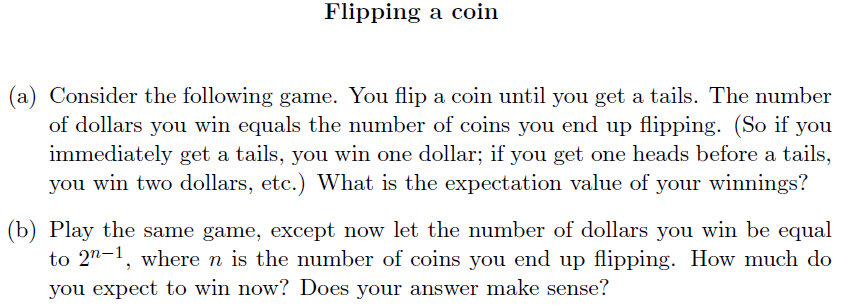Its actually the St. Petersburg Paradox, see it here http://en.wikipedia.org/wiki/St._Petersburg_paradox

a)For the first part the expected value would be =
E(x)=\frac{1}{2}+2\left(\frac{1}{2}\right)^2+3\left(\frac{1}{2}\right)^3+\cdots=2
b)For the second part the expected value would be =
E(x)=\frac{1}{2}+\frac{2}{4}+\frac{4}{8}+\frac{8}{16}=\frac{1}{2}+\frac{1}{2}+\frac{1}{2}+\cdots=\infty
But this doesn't make any sense!!Am I supposed to win an infinite amount of money every time I play the game?Am I missing out something?Can anyone explain rigorously what is exactly happening and why I am getting an expected value of infinity?
-
UP 0 DOWN 0 1 2

2 Answers
I think the problem arises due to our assumption that the mean is equal to the expected value. This is not a problem when a finite mean exists, but when the mean becomes infinite, then we cannot obviously take that to be the expected value as we cannot expect infinity every time.
 Shaswata Roy Yes I had thought about that before.He would get an average of infinite amount of money if and only if he plays it an infinite number of times.The thing is...I could not logically convince myself.Anyways I guess you are correct.Thanks!Upvote·0· Reply ·2014-02-01 07:45:36
Shaswata Roy Yes I had thought about that before.He would get an average of infinite amount of money if and only if he plays it an infinite number of times.The thing is...I could not logically convince myself.Anyways I guess you are correct.Thanks!Upvote·0· Reply ·2014-02-01 07:45:36 Sourup Nag To see it in a simpler way, the expected value i.e. the summation of (value*probability)is not convergent in this case, so it does not give any finite value
Sourup Nag To see it in a simpler way, the expected value i.e. the summation of (value*probability)is not convergent in this case, so it does not give any finite value